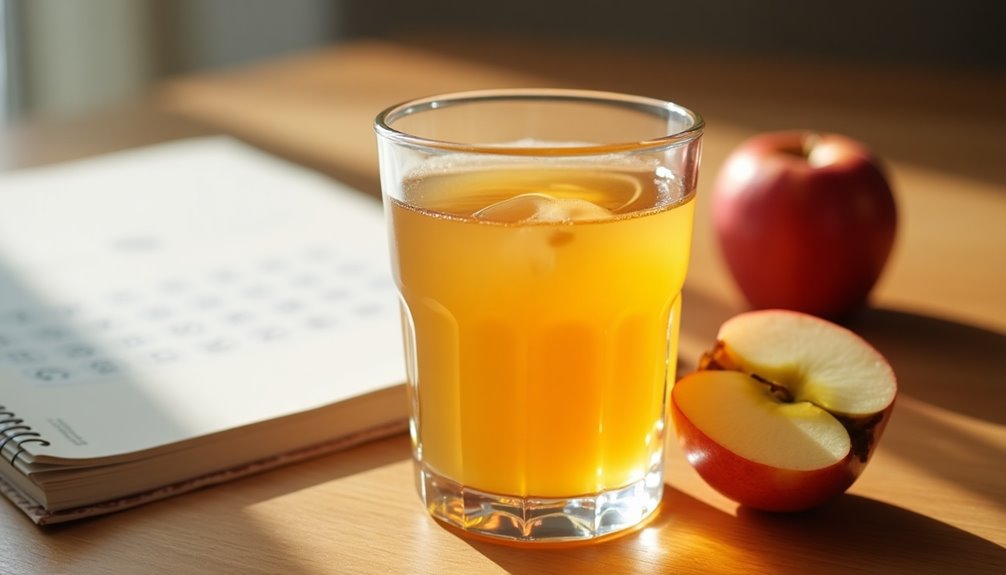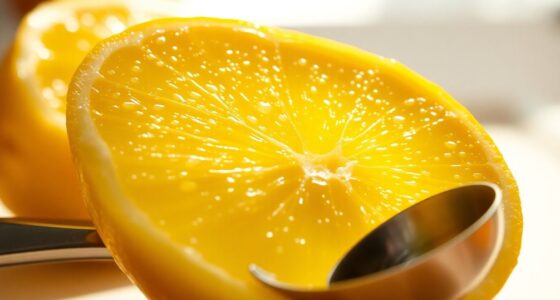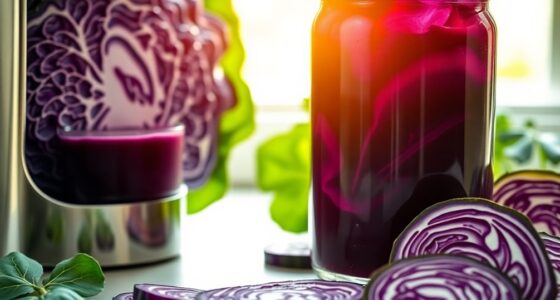Opened apple juice is good for about 7 to 10 days when kept in the refrigerator. For cold-pressed varieties, try to drink it within 2 to 3 days for the best taste. Always store your juice in a tightly sealed container to keep it fresh and avoid leaving it at room temperature for more than 2 hours. If you notice any signs of spoilage, like off odors or discoloration, it’s best to toss it. Discover more tips on storage and safety! Additionally, if you’re unsure about how long apple juice lasts after opening, always err on the side of caution and check for any subtle changes in flavor and aroma. If you regularly find yourself with leftover juice, consider freezing it in ice cube trays for later use in smoothies or other recipes. This way, you can enjoy the freshness without the worry of spoilage.
Key Takeaways
- Opened apple juice typically lasts 7 to 10 days when stored in the refrigerator.
- Cold-pressed apple juice should be consumed within 2 to 3 days after opening for optimal freshness.
- Canned apple juice is best consumed within 10 days after opening to maintain quality.
- Always refrigerate apple juice immediately after pouring to prolong its shelf life.
- Discard any juice showing signs of spoilage, such as off odors, discoloration, or bubbles.

Have you ever wondered how long your opened apple juice stays fresh? You're not alone in this query, as many people enjoy the crisp, refreshing taste of apple juice but may not know how to properly store it.
When you open a bottle or carton of apple juice, it's essential to understand how long it lasts and what conditions help maintain its quality. If stored properly, opened apple juice typically lasts about 7 to 10 days in the refrigerator. This time frame allows you to enjoy your juice at its optimal freshness.
When you open a can of apple juice, you should aim to consume it within 10 days for the best taste and quality. If you've opted for cold-pressed apple juice, keep in mind that it has a shorter shelf life. This type of juice is best enjoyed within 2 to 3 days after opening since it lacks preservatives that extend the life of regular apple juice. So, if you're a fan of cold-pressed varieties, make sure to drink it up quickly!
One critical factor to consider is how you store your juice. If you leave your opened apple juice at room temperature for more than 2 hours, it's no longer safe to drink. Bacteria thrive in warmer environments, so always keep your juice chilled in the refrigerator to minimize the risk of spoilage.
If you want to ensure your juice stays fresh for as long as possible, always return it to the fridge immediately after pouring a glass.
Before consuming opened apple juice, it's wise to check for signs of spoilage. You should look out for off odors, discoloration, or any changes in texture.
These signs indicate that the juice has gone bad, and it's better to err on the side of caution. If you notice anything unusual, it's safest to discard the juice rather than risk getting sick. This is especially important if you have children or guests, as you want to ensure everyone enjoys their drink safely.
Frequently Asked Questions
How Do You Know if Apple Juice Has Gone Bad?
To know if your apple juice has gone bad, start by checking for any sour smells or tastes, which might indicate fermentation.
Look for a cloudy appearance or visible mold; these are clear signs it's unsafe to drink.
If the carton feels swollen or you notice fizzing when you open it, discard it immediately.
Darker color, sediment, or floating particles also suggest spoilage, so trust your senses and when in doubt, throw it out.
How Long Does Juice Last in the Fridge After Opening?
After opening, juice typically lasts about 7 to 10 days in the fridge, depending on the type.
Canned varieties perform well within this timeframe, while cold-pressed juice should ideally be consumed within 2 to 3 days for the best taste and freshness.
Always check for signs of spoilage like off-odors or discoloration before drinking.
Storing juice properly can help maximize its shelf life, so keep it sealed and chilled!
How Long Is Martinelli's Apple Juice Good for Once Opened?
When it comes to Martinelli's apple juice, you'll want to drink it before it goes south.
Once you open the bottle, you've got about 7 to 10 days to enjoy it if you keep it in the fridge.
Make sure it's tightly sealed to lock in that fresh taste.
Keep an eye out for any off odors or mold, as those are signs it's time to say goodbye to your juice.
How to Tell if Juice Has Gone Bad?
To tell if juice has gone bad, start by checking for visible signs like mold or discoloration.
Smell it—if it has a sour odor or tastes off, it's likely spoiled.
Look for cloudiness or bubbles, which indicate fermentation.
If the container is bulging or swollen, that's another red flag.
Lastly, if the juice's color has darkened since you opened it, it's best to discard it to avoid any health risks.
Conclusion
So, after opening, you can enjoy your apple juice for about 7 to 10 days if you keep it refrigerated. Just remember to check for any off smells or changes in color before sipping. For instance, if you've got a half-empty carton sitting in the back of your fridge, don't hesitate to give it a sniff—imagine the disappointment of a sweet apple juice turning sour during a cozy movie night! Stay fresh and enjoy responsibly!
Cindy thoroughly researches juicing trends, techniques, and recipes to provide readers with practical advice and inspiration. Her writing style is accessible, engaging, and designed to make complex concepts easy to understand. Cindy’s dedication to promoting the advantages of juicing shines through her work, empowering readers to make positive changes in their lives through the simple act of juicing.

















